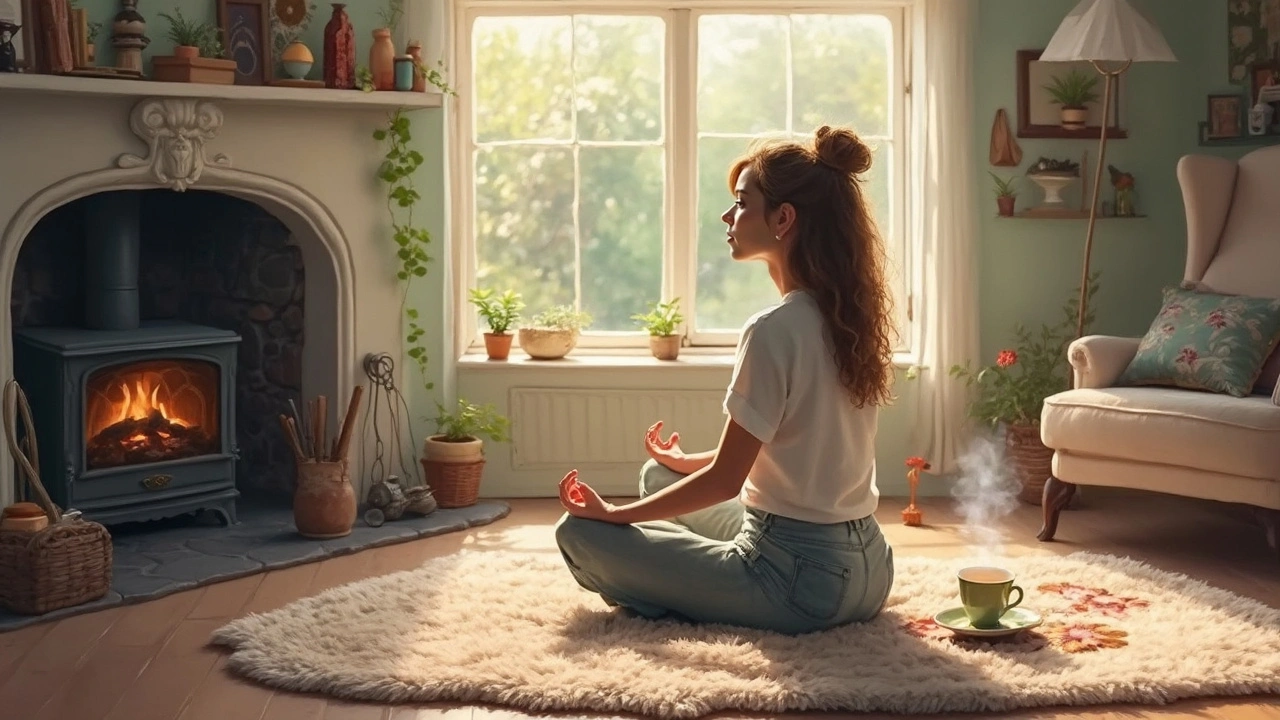So, you're curious about meditation but not entirely sold on its benefits yet? Fair point. Let's start with something mind-blowing—meditation can actually help you see the world more clearly. And I don't mean in the metaphorical sense; regular meditation sharpens your focus, making those foggy moments of indecision a little brighter.
Wondering how else meditation can shake up your life? Picture this: you're cruising through your usual day, and suddenly, you handle a heated situation with Zen-like calmness. That's meditation working some emotional magic. Just a few minutes a day can significantly boost your emotional stability—kind of like free therapy sessions without the couch.
- Boosting Mental Clarity
- Enhancing Emotional Health
- Fostering Creativity
- Improving Sleep Quality
- Strengthening Relationships
- Building Resilience
Boosting Mental Clarity
Let's break it down. Mental clarity isn't just this fluffy, abstract idea; it's about feeling alert, focused, and capable of making decisions without that wishy-washy feeling in your head. How does meditation play into this? Well, it’s pretty straightforward.
Meditation trains your brain to concentrate better. Think of it as a workout for your brain, minus the sweat and gym membership. When you meditate, you're essentially practicing the art of focusing on one thing, like your breath or a mantra. Over time, this practice can help you tune out distractions more effectively.
How It Works
Scientific studies have shown that meditation increases the grey matter in the brain. Yep, that's right—the part of the brain that’s responsible for helping us process information and control emotions gets beefier with practice. It’s like adding horsepower to a car engine; more power leads to better performance.
Practical Steps to Enhance Clarity
- Start small, just aim for 5-10 minutes daily.
- Find a quiet space where you won't be interrupted.
- Focus on your breathing—slow, deep breaths to begin.
- Notice when your mind drifts, and gently bring it back.
- Consistency is key—stick to the same time each day if you can.
Statistics? You bet. A 2022 study showed that regular meditation practitioners reported a 15% improvement in decision-making skills after eight weeks of practice. Trust these numbers—they’re kind of a big deal!
By incorporating mindfulness meditation into your routine, you'll likely improve not just your mental clarity, but your overall life improvements, as well. So, why not give it a shot?
Enhancing Emotional Health
Emotional health might seem like a tough nut to crack, but meditation is here with a sledgehammer. Practicing meditation regularly can make a significant difference in how you deal with stress, anxiety, and all those emotional rollercoasters we're so familiar with. Let's break it down.
Understanding Stress Reduction
Think about how often you're stressed during the week - probably more than you'd like, right? Studies have shown that meditation helps lower cortisol, the stuff responsible for those nasty stress vibes. So, by meditating, you're essentially turning down the cortisol 'volume,' making everything seem more manageable.
Boosting Self-awareness
You know those moments when you feel like you're in a funk but can't quite put your finger on why? That's where meditation steps in. It nudges you towards greater self-awareness. By spending just a few minutes focusing on your breathing or a specific mantra, you start peeling away those layers of confusion. Over time, you become more in tune with your emotions and why you feel what you feel.
Improving Mood and Happiness
Guess what? Meditation can actually make you happier. Evidence suggests that it increases the production of serotonin, the 'feel-good' chemical in your brain. So, incorporating meditation into your daily grind is kind of like giving your overall well-being a vitamin boost.
Practical Tips for Emotional Health
If you're eager to enhance your emotional health through meditation, here's a simple plan:
- Carve out just 5-10 minutes each day to sit quietly and focus on your breath.
- When thoughts pop up, acknowledge them but gently steer your focus back to breathing.
- Practice this consistently, and over time, notice how your reactions to emotional triggers shift.
With all this talk about enhancing emotional health, it’s clear that adding a bit of meditation magic into your routine isn't just beneficial; it’s transformative. Whether it's reducing stress, boosting self-awareness, or improving happiness levels, meditation is an all-rounder for emotional wellness.
Fostering Creativity
If you think creativity is just for artists and writers, guess again! We all need a sprinkle of creativity in our lives, whether we're solving a problem at work or planning a fun weekend with friends. And here's where meditation comes in like a superhero in yoga pants—it taps into your creative potential.
How does this happen? Well, when you meditate, you let your brain chill out. Without the typical chatter and stress clouding your thoughts, you're naturally more open to new ideas and fresh perspectives. It's like giving your brain a mini-vacation, and who wouldn't be more inspired after that?
Unlocking the Right Brain
Meditation nudges your brain from its left-sided logical thinking to exploring the right side—where creativity and imagination flourish. Studies have shown that regular meditation increases activity in the areas of the brain associated with creativity and problem-solving.
Try this: Next time you're stuck on a project, take a break for a quick mindfulness session. Focus on your breathing for a few minutes. You might be surprised at how lightning bolts of inspiration start striking!
Incorporating Meditation into Your Creative Process
Don't worry, you don't need a fancy setup to meditate. Just find a quiet space and close your eyes. Here’s how you can roll meditation into your creative routine:
- Start with five minutes of meditation to clear your mind before diving into a project.
- Mid-task, if you're feeling blocked, step away for a mindful pause to reset.
- Use visualization techniques during meditation to imagine different outcomes and solutions.
Want to see the proof? A 2020 study discovered that workers who meditated regularly reported higher levels of creativity and better workplace performance. So, if you're looking to give your imagination a turbo boost, a little meditation might just do the trick!

Improving Sleep Quality
Struggling to catch those elusive Z's? Believe it or not, meditation can be your secret weapon for a better night's rest. When your mind is racing at bedtime, it's tough to wind down. That's where meditation comes in, helping to calm those racing thoughts.
How It Works
Meditation encourages relaxation by activating the body's natural relaxation response. This helps reduce stress hormones like cortisol, which can be detrimental to a peaceful slumber. Over time, incorporating meditation into your nightly routine can train your body to transition more easily into sleep mode.
Practical Tips for Meditating at Bedtime
- Set the Mood: Dim the lights, reduce noise, and perhaps play some calming music to set the scene.
- Choose a Technique: Focused breathing or guided imagery can help lull your mind into a state ready for sleep.
- Consistency is Key: Try to meditate at the same time every evening to create a routine.
- Start Small: Begin with just a few minutes if you're new, and gradually increase as it becomes easier.
A recent study even found that people who practiced mindfulness and meditation experienced improved sleep patterns and felt more refreshed in the morning. So, next time you're tossing and turning, give meditation a try to catch some much-needed rest.
Strengthening Relationships
You've probably heard that meditation is a game-changer for the mind. But did you know it can also work wonders for your relationships? Seriously, practicing meditation helps you become more attentive, mindful, and less reactive—the perfect ingredients for nourishing any connection.
Let’s break it down. With regular meditation, you're basically training your brain to pause and process before reacting. This means fewer impulsive outbursts during disagreements. Imagine facing an argument with your partner, and instead of snapping, you find yourself breathing, listening fully, and responding with calm clarity. It's like an emotional buffer that strengthens understanding and empathy.
Developing Empathy
Meditation also enhances empathy—a biggie when it comes to building deeper bonds. By fostering self-awareness, it helps you recognize your emotions and, more interestingly, puts you in a better position to understand others' feelings. This doesn’t just make you more pleasant to be around, but it also promotes mutual respect and compassion in relationships.
Enhancing Communication
Another perk? Meditation often improves communication skills. You're not just mindful of what you say; you become a better listener. This boosts the quality of conversations, leading to fewer misunderstandings. Friends and family tend to appreciate this genuine attention, which can naturally strengthen your ties.
Curious about some hard facts? A study from UCLA found that individuals who meditated regularly had denser grey matter in the brain regions tied to emotional regulation and perspective-taking—key players in handling conflicts and understanding others.
Mindfulness practices can subtly but powerfully transform your interactions. It’s not just about avoiding negative patterns; it's about actively creating more positive ones.
Building Resilience
Resilience might sound like one of those fancy self-help buzzwords, but stick with me—it's more important than you might think. Building resilience means bouncing back from whatever life throws at you, and meditation can be an unexpected ally in this. Trust me, when push comes to shove, that's the kind of inner strength you want in your corner.
The process is pretty straightforward. Consistent meditation practice helps you stay grounded. It provides a mental foundation that makes dealing with life's ups and downs less overwhelming. Basically, you'll learn to not let stress get the best of you, handling chaos with something close to grace.
How Meditation Builds Resilience
First off, meditation is all about being aware and present. When you meditate, you get better at noticing your emotions and thoughts without judging them. This might sound like a small thing, but it's actually huge. Rather than getting swept away by every stressful moment, you start to see them for what they are—just moments that will pass.
Plus, multiple studies show that meditation can actually change the brain. And in a good way! It increases the gray matter in the brain regions associated with memory, learning, and emotional regulation. Sounds fancy, right? But in simpler terms, it means you've got a better mental toolset for dealing with hard times.
Practical Steps
You don't need to meditate for hours to start seeing benefits. Even just a few minutes a day can make a difference. Consider trying a beginner-friendly guided meditation to kickstart your resilience journey. Here’s a quick plan:
- Set aside as little as 5-10 minutes daily. First thing in the morning works best for most.
- Sit somewhere comfortable and peaceful. You don't need a fancy setup—your sofa works!
- Close your eyes and try to focus on your breath. Notice how it feels coming in and going out.
- If your mind wanders (and it will), gently bring it back to your breath. No judgment here. It’s all part of the process.
Building resilience isn't about becoming unbreakable. It’s about becoming flexible and adaptable, so life’s inevitable challenges don't leave you feeling overwhelmed. And with meditation enhancing your life improvements, you’ll be handling surprises with newfound ease.






